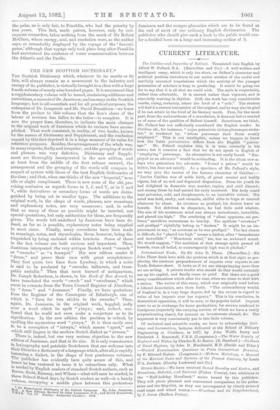THE NEW SCOTTISH DICTIONARY.*
THE Scottish Dictionary which, whatever be its merits or its fate, will always remain as a monument to the industry and energy of its publisher, is virtually brought to a close with a huge fourth volume of nearly nine hundred pages. It is announced that a supplementary volume will be issued, containing additions and corrections, a memoir of Dr. Jamieson, and an essay on the Scottish language ; but in all essentials and for all practical purposes, the enterprise of Dr. Longmuir and Mr. David Donaldson—we learn from the preface to this volume that the lion's share of the labour of revision has fallen to the latter—is complete. It is now the proper time, therefore, to indicate the main changes in the original work of Jamieson which its revisers have accom- plished. That work consisted, in reality, of two books, known by the names of Dictionary and Supplement, and the confusion caused by this fact deprived it in a large measure of its value for reference purposes. Besides, the arrangement of the whole was, in many respects, faulty and irregular; and the grouping of words and phrases was very defective. Dictionary and Supple- ment arc thoroughly incorporated in the new edition, and at least from the middle of the first volume onward, the arrangement and the grouping of the words will compare in respect of system with those of the best English dictionaries of the time ; and that, when one thinks of the new "Imperial," is no idle or slight compliment. There is now none of the old, pro- voking confusion as regards forms in I, J, and Y, or in U and V, while derivatives or secondary forms of words are distin- guished by being set in smaller type. The additions to the original work, in the shape of words, phrases, new meanings, and explanatory notes, are very numerous ; and, in order that as many of these as possible might be inserted, not special quotations, but only authorities for them, are frequently given. The words left undefined by Jamieson have been de- fined, as far as is possible, explanatory notes being supplied in most cases. Finally, many corrections have been made in meanings, notes, and etymologies, these, however, being dis- tinguished by being enclosed within brackets. Some of these in the last volume are both curious and important. Thus, Jamieson interpreted the very antique Scotch word " swesch " or " swesche " as "a trumpet." His new editors render it "drum," and prove their case with groat completeness. They first quote two lines from Lyndsay, in which a noise is said to be produced by "swesche, talburnis, and trum- pettis awfullie." Then that most learned of antiquarians, Dr. Joseph Robertson, is shown, in his Book of Bon Accord, to have translated the words " swesh " and " sweehman," which occur in extracts from the Town Council Register of Aberdeen, by " drum " and " drummer." Finally, we have quotations from the Register of the Canongate of Edinburgh, one of Which is " Item for twa stickis to the swesche." Then, again, Dr. Jamieson, in the original work, boggled, sadly over a word which he spelt " yiwyn ; and, indeed, con- fessed that he dould not even make a conjecture as to its signification. In the new edition the problem is -solved, by spelling the mysterious word " ytwyn." It is then easily seen to be a corruption of " intwyn," which means " apart," and which still lingers in the modern Scotch -dialect as " atween." There is, indeed, but one very serious objection to the new edition of Jamieson, and that is its size. It is only connoisseurs in lexicography and patriotic Scotchmen that can welcome into their libraries a dictionary of a language which, after all, is rapidly becoming a dialect, in the shape of four ponderous volumes. The publisher has evidently been quite aware of this, and hence he has ventured to issue it to subscribers only. What is needed by English readers of standard Scotch authors, such as Burns, Scott, Ramsay, and Wilson—what will soon be needed, in these School-Board days, by Scotch readers as well—is a handy volume, occupying a middle place between this portentous D"Udn Ailrftoca Diationanj of the Sottish Language. By Sohn Jamieson, F.PC.I.B. Vol. Prthkineeyvi.selliebianJoiohrnoLoymnir,ID.D., and David Donaldson,
i::2. Jamieson and the meagre glossaries which are to be found at the end of most of our ordinary English dictionaries. The publisher who should give such a book to the public would con- fer a decided boon on a large and increasing section of it.






























 Previous page
Previous page